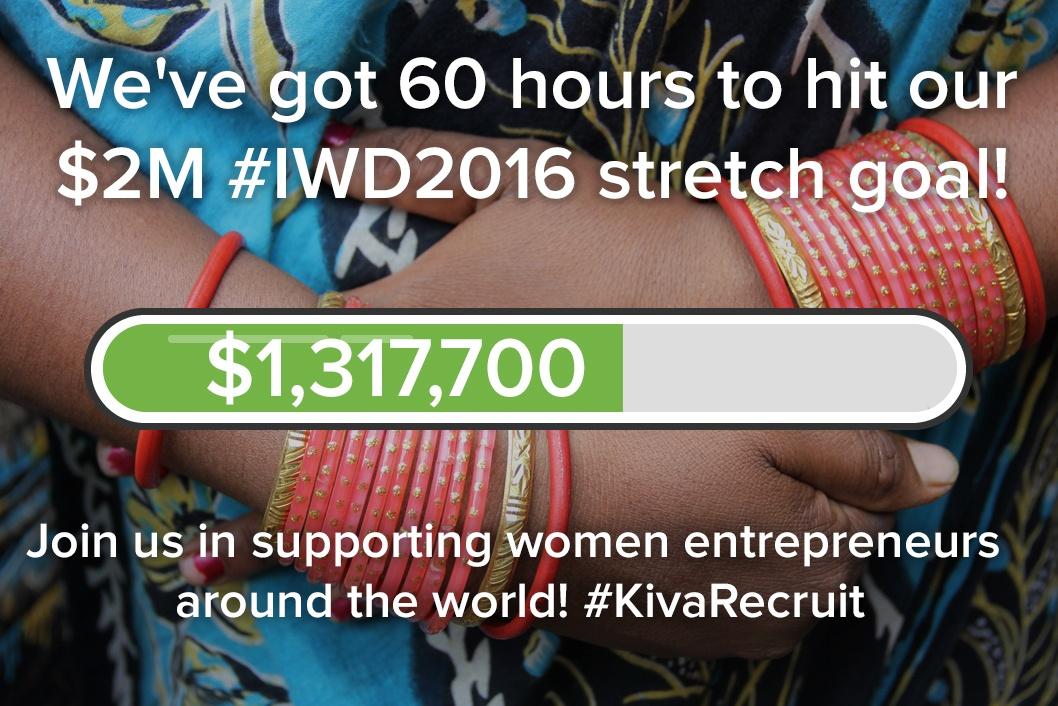
Kiva, the microfinance nonprofit that connects individual lenders to entrepreneurs seeking loans in order to break of poverty, has largely been a success story since its launch in 2005. According to Kiva’s statistics, over $820 million in small loans from almost 1.4 million people have been distributed to borrowers in 84 countries — with a repayment rate of over 98 percent.
Kiva’s model is relatively simple. Visitors to its site can contribute as little as $25 for loans after vetting hundreds of potential borrowers. Kiva, meanwhile, coordinates with almost 300 various partners to vet those in need of loans. Lenders receive updates and can view those loans being paid incrementally to his or her Kiva account. At the end of the loan cycle, the lender will receive his or her money back, or can opt to let that amount be loaned to another borrower.
To mark this year’s International Women’s Day, Kiva recently set a goal to procure $1 million in total loans for women entrepreneurs. The campaign has been so successful that the total reached well over $1.3 million at press time. So, Kiva has extended the campaign to midnight tonight with a goal of $2 million.
For Kiva, the decision to focus on women is a simple one to make. According to the International Labor Office, at least 70 percent of the world’s poor are women. Yet because many of them make up what is often called the “informal economy,” they often lack access to financial services, including access to credit.
A quick summary of Kiva’s demographics show how this organization is trying to meet those demands in the world of social enterprise. Women are in search of loans on Kiva’s site by men by over a ratio of 2 to 1. And the vast majority of those seeking loans work within the food and agriculture sectors. The needs, however, run all over the map, from a woman in Lebanon seeking a loan to pay for her children’s education, to a collective in Paraguay that employs women who support their families through work on sewing projects.
Kiva’s track record of accomplishments is in part due to the fact that its business model is flexible and it has demonstrated a willingness to work with various partners around the world to introduce women to the world of finance.
The NGO partnered with Fair Trade USA to establish a micro-loan program for coffee farmers, which has allowed them to borrow funds for projects including farm maintenance, renovation or to purchase fertilizer. Kiva has also partnered with Intuit in order to fund small business loan opportunities here in the U.S. and abroad.
For those of us who are more fortunate and are interested in impact investing, but have no idea where to start, NGOs such as Kiva are a way to get those toes wet.
Image credit: Kiva

Leon Kaye has written for 3p since 2010 and become executive editor in 2018. His previous work includes writing for the Guardian as well as other online and print publications. In addition, he's worked in sales executive roles within technology and financial research companies, as well as for a public relations firm, for which he consulted with one of the globe’s leading sustainability initiatives. Currently living in Central California, he’s traveled to 70-plus countries and has lived and worked in South Korea, the United Arab Emirates and Uruguay.
Leon’s an alum of Fresno State, the University of Maryland, Baltimore County and the University of Southern California's Marshall Business School. He enjoys traveling abroad as well as exploring California’s Central Coast and the Sierra Nevadas.














